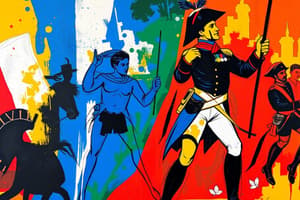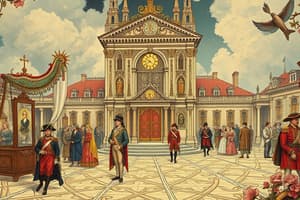Podcast
Questions and Answers
The French Revolution was an __________ against the _____________ in France beginning _____________________ with the storming of the ____________, resulting in the establishment of a _______________ and ending in 1799 with the Consulate under _____________.
The French Revolution was an __________ against the _____________ in France beginning _____________________ with the storming of the ____________, resulting in the establishment of a _______________ and ending in 1799 with the Consulate under _____________.
uprising, monarchy, July 14, 1789, Bastille, republic, Napoleon
Match the following terms with their descriptions:
Match the following terms with their descriptions:
taille = A land tax from which the nobles and clergy were exempt Waterloo = The site of Napoleon's final defeat guillotine = A device used for beheading people coup d’etat = A sudden, violent, and illegal seizure of power from a government Marie Antoinette = The Queen of France during the Revolution National Assembly = A revolutionary assembly formed by representatives of the Third Estate Napoleonic Civil Code = A new law code which embodied Enlightenment principles such as equality of citizens before the law, religious toleration, and abolition of feudalism Corsica = The birthplace of Napoleon Bastille = A medieval fortress and prison in Paris, stormed on July 14, 1789 Robespierre = A radical Jacobin leader during the Reign of Terror Third Estate = The commoners of France bourgeoisie = The middle class of France sans culottes = The common people of the lower classes in late 18th century France relics of feudalism = Aristocratic privileges and special rights Voltaire = An influential philosophe who advocated for freedom of speech and religious toleration
Which of the following best describes the composition of the Third Estate in pre-revolutionary France?
Which of the following best describes the composition of the Third Estate in pre-revolutionary France?
- Peasants, artisans, and the bourgeoisie (correct)
- Only peasants and agricultural workers
- Clergy and nobility
- Members of the royal family and court officials
Match each Estate with its corresponding members:
Match each Estate with its corresponding members:
List three adjectives that describe the French Revolution, justifying each with a specific example from the historical events.
List three adjectives that describe the French Revolution, justifying each with a specific example from the historical events.
The primary goal of the French Revolution was to establish a constitutional monarchy with limited powers for the king.
The primary goal of the French Revolution was to establish a constitutional monarchy with limited powers for the king.
How did the political system in France change from before the Revolution to when Napoleon became Emperor?
How did the political system in France change from before the Revolution to when Napoleon became Emperor?
Briefly describe the Enlightenment and its influence on the French Revolution.
Briefly describe the Enlightenment and its influence on the French Revolution.
Which of the following Enlightenment ideas had the least impact on the French Revolution?
Which of the following Enlightenment ideas had the least impact on the French Revolution?
What role did the Enlightenment play in the French Revolution?
What role did the Enlightenment play in the French Revolution?
Who is credited with having said, 'I am the revolution'?
Who is credited with having said, 'I am the revolution'?
The motto of the French Revolution was 'Liberté, Égalité, _________'
The motto of the French Revolution was 'Liberté, Égalité, _________'
What does 'Liberté, Égalité, Fraternité' mean?
What does 'Liberté, Égalité, Fraternité' mean?
Approximately how many people were killed during the Reign of Terror?
Approximately how many people were killed during the Reign of Terror?
Why was the Reign of Terror so violent?
Why was the Reign of Terror so violent?
On what day of the year do the French celebrate Bastille Day?
On what day of the year do the French celebrate Bastille Day?
Why is Bastille Day a national holiday in France?
Why is Bastille Day a national holiday in France?
Who is believed to have said the phrase “let them eat cake.”?
Who is believed to have said the phrase “let them eat cake.”?
What does the quote “let them eat cake” generally mean is implied by the phrase?
What does the quote “let them eat cake” generally mean is implied by the phrase?
Which of the following best explains the tax burden in France prior to the French Revolution?
Which of the following best explains the tax burden in France prior to the French Revolution?
Flashcards
Taille
Taille
A tax on land or property.
Waterloo
Waterloo
The final defeat of Napoleon Bonaparte in 1815.
Guillotine
Guillotine
A device used for executions by beheading during the French Revolution.
Coup d’etat
Coup d’etat
Signup and view all the flashcards
Marie Antoinette
Marie Antoinette
Signup and view all the flashcards
National Assembly
National Assembly
Signup and view all the flashcards
A comprehensive system of laws established by Napoleon.
A comprehensive system of laws established by Napoleon.
Signup and view all the flashcards
Corsica
Corsica
Signup and view all the flashcards
Bastille
Bastille
Signup and view all the flashcards
Robespierre
Robespierre
Signup and view all the flashcards
Third Estate
Third Estate
Signup and view all the flashcards
Bourgeoisie
Bourgeoisie
Signup and view all the flashcards
Sans culottes
Sans culottes
Signup and view all the flashcards
Relics of feudalism
Relics of feudalism
Signup and view all the flashcards
Voltaire
Voltaire
Signup and view all the flashcards
Reign of Terror
Reign of Terror
Signup and view all the flashcards
Bastille Day
Bastille Day
Signup and view all the flashcards
French Revolution
French Revolution
Signup and view all the flashcards
First Estate
First Estate
Signup and view all the flashcards
Second Estate
Second Estate
Signup and view all the flashcards
Study Notes
- The French Revolution was an uprising against the monarchy in France.
- It started in 1789 with the storming of the Bastille.
- The revolution resulted in the establishment of a republic.
- It ended in 1799 with the Consulate under Napoleon.
Matching Section Key Terms
- taille: A land tax
- Waterloo: Site of Napoleon's final defeat
- guillotine: A device used for executions
- coup d’etat: A sudden seizure of power
- Marie Antoinette: Queen of France during the revolution
- National Assembly: A revolutionary assembly
- Napoleonic Civil Code: A legal code established by Napoleon
- Corsica: Napoleon's birthplace
- Bastille: A prison stormed at the start of the revolution
- Robespierre: A radical leader during the revolution
- Third Estate: The common people of France
- bourgeoisie: The middle class
- sans culottes: Radical lower-class revolutionaries
- relics of feudalism: Remaining feudal rights and obligations
- Voltaire: An Enlightenment writer
The Three Estates
First Estate
- Composed of clergy.
- Included priests, bishops, and cardinals.
Second Estate
- Composed of nobles.
- Included the King’s niece, Marie Antoinette, and members of the Bourbon family.
Third Estate
- Included peasants, artisans, bourgeoisie, shop owners, carpenters, physicians, and tax collectors.
- Paid all the taxes.
Essay Questions
- The French Revolution's changes and evolution need to be considered.
- The shift in France's political system from before the Revolution to Napoleon's rule as Emperor needs to be examined.
- The Enlightenment's main political ideas inspired the French Revolution.
Short Answer Questions
- Need to identify who said, “I am the revolution.”
- Need to identify the percentage of the population, land ownership and tax payment responsibilities for each of the three estates.
- Need to identify the meaning of motto or slogan of supporters of the French Revolution.
- The Reign of Terror's violence and death toll need to be examined.
- Bastille Day's date and significance as a French national holiday needs to be identified.
- The statement “let them eat cake.” needs to be examined.
Studying That Suits You
Use AI to generate personalized quizzes and flashcards to suit your learning preferences.




